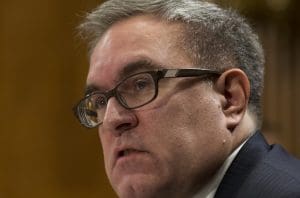EPA moves to block all studies on clean air and water
The Environmental Protection Agency just proposed a rule that would effectively ensure science never gets in the way of their plans.

The Environmental Protection Agency is about to make it a lot harder to use legitimate scientific and medical studies in crafting environmental policy. According to a report published Monday by the New York Times, the agency is expanding its proposed “Strengthening Transparency in Regulatory Science” rule in a way that could completely dismantle how the agency uses scientific studies. It’s the latest salvo in the agency’s war on the exact thing it’s supposed to protect — the environment.
The title “Strengthening Transparency in Regulatory Science” sounds harmless enough, but with the new changes, the rule would require scientists to turn over all their raw data, including confidential medical data, before the EPA will consider the conclusions of the study.
But there’s a huge problem with this, and it’s a problem the agency is well aware of. Studies about the effects of pollution on humans require scientists to collect an enormous amount of personal health data, and that data is collected under confidentiality agreements. Scientists can’t provide that data to the EPA because doing so would violate those agreements.
If the EPA doesn’t get that data, the proposed rule says it would “reserve the right to place less weight on the studies, to the point of entirely disregarding them.” The agency’s rationale is that it can’t independently verify the science without the underlying data, but that ignores the fact that other scientists and researchers vet those types of studies long before they are relied upon by the EPA.
EPA head Andrew Wheeler told Congress in September that the agency is “committed to the highest quality science.” But the real goal here is to make sure there is no science that might undercut the administration’s war on the environment. It’s much easier to let coal plants pollute the nation’s waterways and overlook high levels of lead in drinking water if you just ignore science. And no respectable scientist is going to break a confidentiality agreement, and very few people are going to agree to have their health data tracked without such an agreement.
It gets worse. The proposed rule also contains a provision that it could apply retroactively. In other words, it could be used to undo existing public health regulations if scientists won’t give up the data that underpinned the original regulations. This could undercut rules that are decades old.
The New York Times noted that a 1993 Harvard University study “definitively linked” air pollution to premature deaths, and that study is the foundation of our current air-quality laws. The study tracked 22,000 people and collected data on their medical and occupational histories. When those regulations come up for renewal, the EPA could throw the whole study out and dismantle air pollution laws.
This administration has been engaged in a war on science from the very start. This latest proposal, though, might be the worst of all.
Published with permission of The American Independent Foundation.
Recommended

President Biden visits Prince William park to talk solar, youth involvement on Earth Day
Virginia set to receive $156 million from U.S. Environmental Protection Agency program
By Charlie Paullin, Virginia Mercury - April 23, 2024
Texas governor and attorney general do little to curb state’s chemical plant crisis
Republicans Greg Abbott and Ken Paxton have taken thousands of dollars in donations from chemical companies and their affiliated PACs.
By Jesse Valentine - December 08, 2023
‘We’ve been waiting for this’: Union workers cheer Biden’s hydrogen hub plan
Federal funding for the hub is estimated to bring over 20,000 jobs to the Pennsylvania-New Jersey-Delaware area.
By Anna Gustafson - October 17, 2023







































































